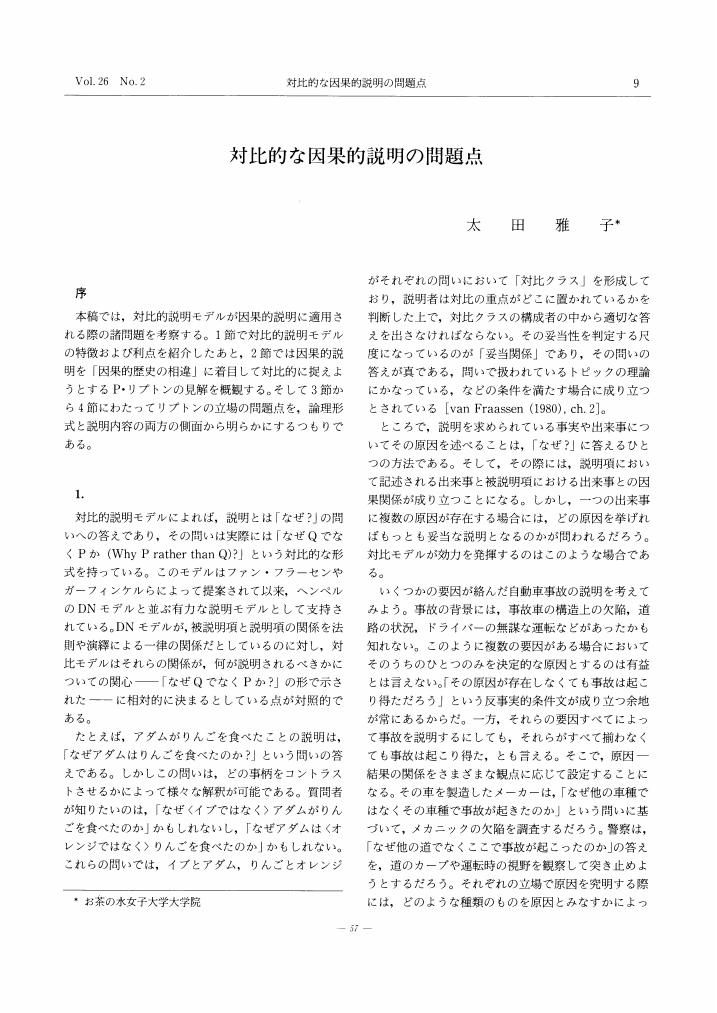5 0 0 0 OA 無知の責任と無知による行為の責任
- 著者
- 太田 雅子
- 出版者
- 東洋大学国際哲学研究センター
- 雑誌
- 国際哲学研究 = Journal of International Philosophy (ISSN:21868581)
- 巻号頁・発行日
- vol.9, pp.187-194, 2020-03
4 0 0 0 IR 性質としての心の因果性
- 著者
- 太田 雅子 OTA Masako おおた まさこ
- 出版者
- お茶の水女子大学大学院人間文化創成科学研究科
- 雑誌
- 人間文化創成科学論叢 (ISSN:13448013)
- 巻号頁・発行日
- vol.10, pp.153-160, 2007
4 0 0 0 OA 付随性と説明の十分性について
- 著者
- 太田 雅子
- 出版者
- 日本科学哲学会
- 雑誌
- 科学哲学 (ISSN:02893428)
- 巻号頁・発行日
- vol.32, no.1, pp.45-54, 1999-05-15 (Released:2009-05-29)
- 参考文献数
- 9
Higher-level (mental, sociological and biological, etc.) entities are said to be supervenient on more basic, lower-level (physical, micro-level) entities, and there is a view that lower-level theories can completely and sufficiently explain higher-level events. But Harold Kincaid criticizes such a view. He does not deny that lower-level theories do explain something, but argues that they are only partial and incomplete, because they cannot refer to higher-level kinds which supervene on the relevant lower-level entities and answer important questions about causal laws. I will argue that the completeness or sufficiency of explanation is often evaluated interest-relatively, and, against Kincaid, that higher-level explanation cannot be sufficient without mentioning lower-level causal mechanism.
4 0 0 0 付随性と説明の十分性について
- 著者
- 太田 雅子
- 出版者
- 日本科学哲学会
- 雑誌
- 科学哲学 (ISSN:02893428)
- 巻号頁・発行日
- vol.32, no.1, pp.45-54, 1999
Higher-level (mental, sociological and biological, etc.) entities are said to be supervenient on more basic, lower-level (physical, micro-level) entities, and there is a view that lower-level theories can completely and sufficiently explain higher-level events. But Harold Kincaid criticizes such a view. He does not deny that lower-level theories do explain something, but argues that they are only partial and incomplete, because they cannot refer to higher-level kinds which supervene on the relevant lower-level entities and answer important questions about causal laws. I will argue that the completeness or sufficiency of explanation is often evaluated interest-relatively, and, against Kincaid, that higher-level explanation cannot be sufficient without mentioning lower-level causal mechanism.
3 0 0 0 OA 不合理な信念はいかにして説明されるか?
- 著者
- 太田 雅子
- 出版者
- 日本科学哲学会
- 雑誌
- 科学哲学 (ISSN:02893428)
- 巻号頁・発行日
- vol.38, no.1, pp.17-29, 2005-07-25 (Released:2009-05-29)
- 参考文献数
- 9
We often have irrational beliefs which are not coherent with the others. If they could be explained under "The Principle of Charity", they would no longer be regarded as irrational. How can we explain irrational beliefs as such and give their place in the system of our beliefs? Donald Davidson proposed "the partitioning of mind" as the answer to this question, but his solution is hopeless because it seems to be inconsistent with holism. I propose the idea of Motivated Irrationality as an explanatory strategy of irrationality, because I think it can explain irrationality more simply than the mental partitioning and give the way out of the paradox of irrationality.
2 0 0 0 OA 対比的な因果的説明の問題点
- 著者
- 太田 雅子
- 出版者
- 科学基礎論学会
- 雑誌
- 科学基礎論研究 (ISSN:00227668)
- 巻号頁・発行日
- vol.26, no.2, pp.57-62, 1999-03-31 (Released:2009-07-23)
- 参考文献数
- 9
2 0 0 0 OA デカルト的な心は生き残れるか?
- 著者
- 太田 雅子
- 出版者
- The Philosophy of Science Society, Japan
- 雑誌
- 科学哲学 (ISSN:02893428)
- 巻号頁・発行日
- vol.44, no.1, pp.1_75-1_90, 2011 (Released:2011-10-13)
- 参考文献数
- 7
In his Book Kagaku no Sekai to Kokoro no Tetsugaku, Michio Kobayashi features on Descartes’ theory of minds as “subjective-active consciousness”, and defends it against the physicalist movement of philosophy of mind. I try to show that Kobayashi’s method has a difficulty for defending the existence of our mind because Descartes didn’t allow the scientific investigation of our mental experience from outside. In addition, Cartesian theory of mind cannot appropriately grasp the significance of “other minds”. Instead of Cartesian view, I propose the “mind in general” view, in which minds are open to our world and exists in our communication.
1 0 0 0 OA 因果的説明と因果関係
- 著者
- 太田 雅子
- 出版者
- 科学基礎論学会
- 雑誌
- 科学基礎論研究 (ISSN:00227668)
- 巻号頁・発行日
- vol.24, no.2, pp.39-44, 1997-03-31 (Released:2009-07-23)
- 参考文献数
- 10
本稿では, 「因果的説明が因果関係を表すならば, それは何と何との間に成り立つ関係なのか?」という問題提起のもとに考察を行う。「因果的説明」には, 「cがeを引き起こした」という形の単称因果言明の他に, 文を単位として理由を表す言明「AだからBである」または「BなのはAだからだ」をも含めて考えることとする。手順としては,「出来事」を因果関係の関係項とする立場を取り上げた後, それ以外の存在者 (事実, 性質など) もまた因果関係を構成しうることを示し, それによって因果的説明にもたらされる利点を明らかにしたいと思う。
1 0 0 0 OA 自已欺瞞の条件
- 著者
- 太田 雅子
- 出版者
- 日本科学哲学会
- 雑誌
- 科学哲学 (ISSN:02893428)
- 巻号頁・発行日
- vol.37, no.1, pp.15-27, 2004-07-25 (Released:2009-05-29)
- 参考文献数
- 11
It is thought that the problem of self-deception is difficult to treat because it includes a paradox. I investigate under what conditions self-deception occurs, rather than how the paradox is solved. I think one of the important conditions of selfdeception is that the two apparently contradicting beliefs coexist without either of them being unconscious. After surveying the discussions concerning whether self-deception is intentional, I focus on the role of "motivation", following Alfred Mele, and try to state the necessary and sufficient conditions of self-deception on the basis of the motivations and situa-tions of the self-deceivers.
1 0 0 0 自己欺瞞に責任を問えるか
- 著者
- 太田 雅子
- 出版者
- 有斐閣
- 雑誌
- 法哲学年報 (ISSN:03872890)
- 巻号頁・発行日
- pp.270-281, 2013
